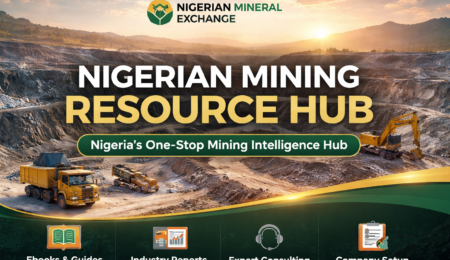Introduction:
Are you considering venturing into the exciting world of mining in Nigeria? This concise, but comprehensive guide is your essential resource, providing everything you need to know to get started. From understanding the regulatory landscape to identifying investment opportunities and navigating the operational aspects, this guide will equip you with the knowledge and insights necessary to embark on your mining journey in Nigeria.
Section 1: Understanding Nigeria’s Mining Sector:
- Overview of Nigeria’s Mineral Resources: Nigeria boasts a diverse range of mineral resources, including gold, gemstones, lithium, tantalite, beryllium, tin, lead, zinc, iron ore, coal, limestone, barite, and many others. This abundance of resources presents significant opportunities for investors.
- The Regulatory Framework: The Nigerian Minerals and Mining Act of 2007 is the primary legislation governing the mining sector. It outlines the ownership of mineral resources, the licensing process, environmental regulations, and other key aspects. Understanding this act is crucial for operating legally and efficiently.
- Government Agencies and Key Stakeholders: Several government agencies play a crucial role in regulating and promoting the mining sector, including the Ministry of Solid Minerals Development (MSMD), the Mining Cadastre Office (MCO), and the Nigerian Geological Survey Agency (NGSA). Understanding their roles and responsibilities is essential for navigating the regulatory landscape.
Section 2: Getting Started: Key Steps and Requirements:
- Choosing the Right Mineral: Selecting the right mineral to focus on depends on various factors, including market demand, geological availability, and investment capital. Conducting thorough market research and geological surveys is crucial.
- Obtaining the Necessary Licenses and Permits: Obtaining the appropriate mineral titles and licenses is a crucial step. This process involves submitting applications to the MCO, meeting specific requirements, and obtaining approvals. Different licenses exist for exploration, mining, and quarrying.
- Conducting Feasibility Studies: Before investing significant capital, conducting comprehensive feasibility studies is essential. These studies assess the technical, economic, and environmental viability of a mining project.
- Environmental Impact Assessment (EIA): An EIA is required for most mining projects to assess their potential environmental and social impacts. This process involves conducting studies, consulting with local communities, and developing mitigation measures.
- Community Engagement and Social Responsibility: Engaging with local communities and addressing their concerns is crucial for successful and sustainable mining operations. Building strong relationships with local stakeholders is essential.
Section 3: Operational Aspects of Mining in Nigeria:
- Exploration and Geological Surveys: Conducting thorough exploration and geological surveys is essential for identifying and quantifying mineral deposits. This involves using various techniques, such as geological mapping, geophysical surveys, and drilling.
- Mining Methods and Techniques: The choice of mining method depends on various factors, including the type of mineral, the geological setting, and economic considerations. Common methods include open-pit mining, underground mining, and alluvial mining.
- Mineral Processing and Beneficiation: After extraction, minerals often need to be processed to remove impurities and increase their value. This involves various techniques, such as crushing, grinding, and separation.
- Logistics and Transportation: Efficient logistics and transportation are essential for moving minerals from the mine site to processing facilities and markets. This involves planning transportation routes, securing transportation services, and managing logistics.
- Health and Safety: Ensuring the health and safety of workers is a top priority in the mining industry. Implementing robust safety protocols and providing appropriate training are essential.
Section 4: Investment and Financing:
- Sources of Funding: Various sources of funding are available for mining projects, including equity financing, debt financing, and government grants.
- Investment Opportunities: Opportunities exist for both local and foreign investors in various aspects of the mining sector, from exploration and mining to processing and value addition.
- Financial Planning and Management: Sound financial planning and management are crucial for the success of any mining project. This involves developing budgets, managing costs, and tracking financial performance.
Section 5: Key Challenges and Opportunities:
- Infrastructure Development: Addressing infrastructure gaps remains a key challenge for the sector. However, government efforts to improve infrastructure are creating new opportunities.
- Security Concerns: Ensuring security in mining areas is an ongoing challenge. However, the government is implementing measures to enhance security and create a stable operating environment.
- Environmental and Social Sustainability: Balancing economic development with environmental protection and social responsibility is crucial. However, Nigeria’s commitment to sustainable mining practices is creating a positive trend.
📘 The Nigeria Mineral Trading & Licensing Blueprint (2026 Edition)
If you are serious about buying, selling, or trading minerals legally in Nigeria, you cannot afford to rely on guesswork, outdated advice, or hearsay. The regulatory environment is tightening fast, and costly mistakes now lead to permit denials, seizures, or permanent blacklisting.
That’s why we created The Nigeria Mineral Trading & Licensing Blueprint: 2026 Guide to Buying Center Licenses & Purchase Permits — an updated, clear, step-by-step, insider guide that shows you exactly how to obtain Mineral Buying Center Certificates, Purchase & Possession Permits, and related approvals without delays or regulatory traps.
This guide distills real regulatory procedures for 2026, compliance requirements, and practical insights used by serious operators — saving you months of confusion, wasted money, and avoidable risk.
If mineral trading is part of your business future, this blueprint is not optional — it’s protection.
Conclusion:
This guide provides a comprehensive overview of the Nigerian mining sector, equipping you with the knowledge and insights needed to get started. With careful planning, thorough research, and a commitment to responsible mining practices, you can successfully navigate this exciting industry and contribute to Nigeria’s economic growth.
Want to learn more about the Nigerian Mining Industry? Explore our collection of Ebooks on the Nigerian Mining Industry, covering everything from the lucrative lithium and gold sectors to the vibrant gemstone trade. We delve into critical aspects such as mining operations, environmental compliance, investment opportunities, mining finance, and navigating the complex regulatory landscape. Discover valuable insights and gain a deeper understanding of the Nigerian mining and mineral trade sector. SEE: https://nigerianmineralexchange.com/product-category/ebooks
Download the Digital Copy of Finding Gold in Nigeria: A Practical Guide for Landowners, Investors, and Prospectors HERE: https://selar.com/7ay403
READ Also:
The Ultimate Guide to Starting a Mining Company in Nigeria
Need a Mining License or Mineral Trade Permit in Nigeria? Here’s How We Can Help





Leave a Reply